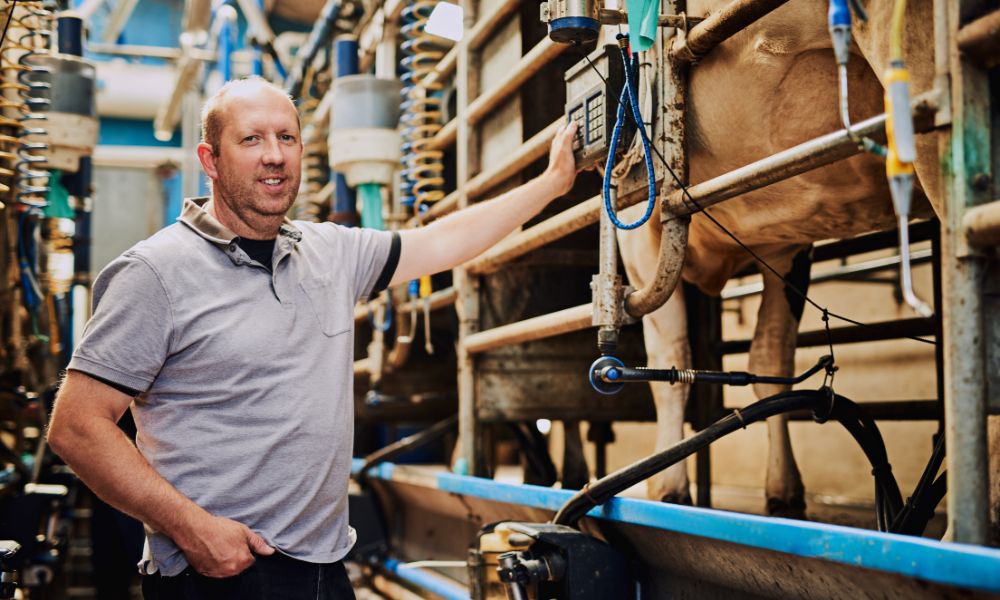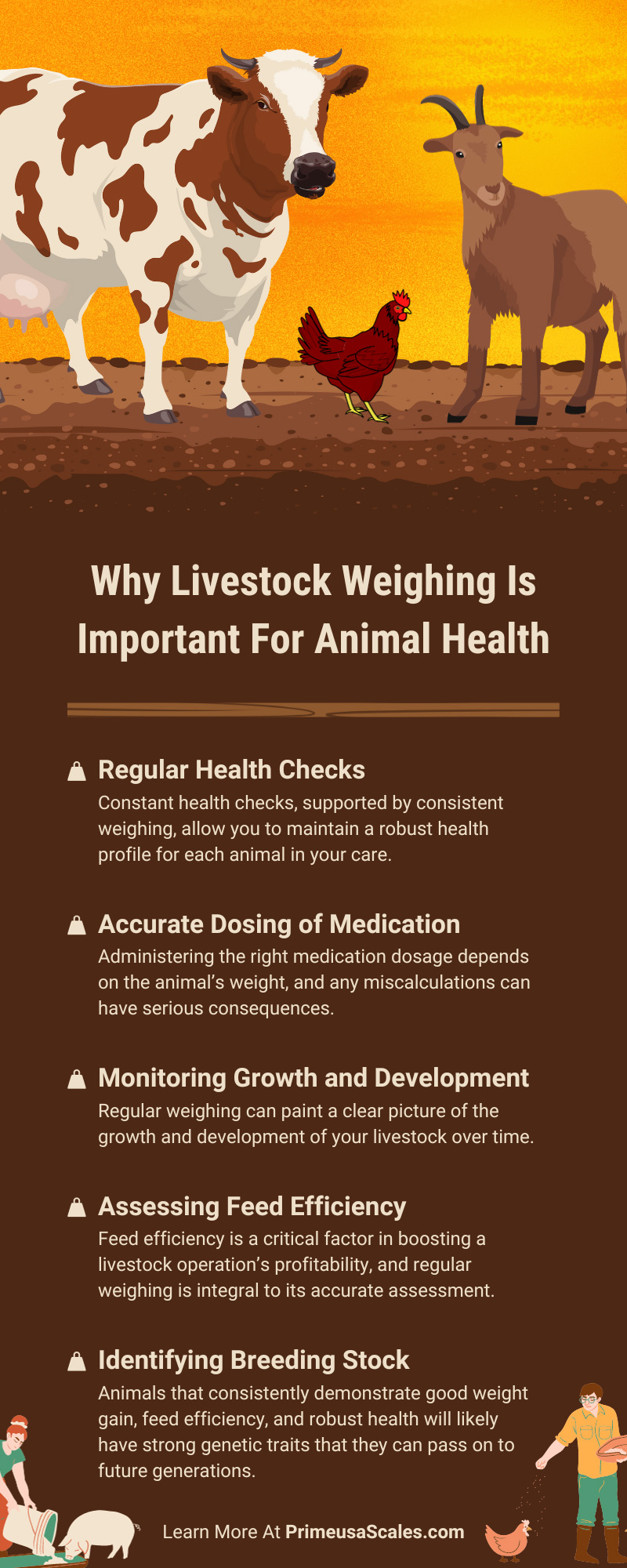
The health and well-being of livestock are critical aspects of an effective and profitable farming operation. Consistently and accurately assessing your livestock’s weight plays a key role in ensuring their overall health and development.
This practice is not solely about disease prevention or treatment but extends to other aspects like growth patterns, breeding success, and overall vitality. Understanding why livestock weighing is important for animal health can help you act at the right time, ensure your animal’s optimal health, and drive your farm toward profitability.
Regular Health Checks
Constant health checks, supported by consistent weighing, allow you to maintain a robust health profile for each animal in your care. These checks will help you understand normal weight trends for your livestock and identify deviations that could indicate health issues.
For instance, unexplained weight loss, despite a healthy appetite and diet, could point to parasitic infections, metabolic disorders, or other illnesses. Similarly, rapid weight gain might signify issues such as overfeeding, lack of exercise, or certain endocrine diseases. Thus, regular weighing plays a crucial role in early disease detection and prevention, allowing for timely veterinary intervention.
Accurate Dosing of Medication
Administering the right medication dosage depends on the animal’s weight, and any miscalculations can have serious consequences. Overdosing not only risks toxic effects, but repeated over-exposure can also lead to the development of drug resistance within the animal population, undermining the effectiveness of future treatments.
Conversely, under-dosing may not sufficiently tackle an infection or disease, allowing it to persist or worsen. Accurate weight-based dosing is also financially necessary as it prevents medication waste, which can be expensive.
Monitoring Growth and Development
Regular weighing can paint a clear picture of the growth and development of your livestock over time. Precise monitoring ensures that each animal grows appropriately for its age, breed, and species. Deviations from the expected growth path can indicate health issues, nutritional deficiencies, or problems with the animal’s living conditions.
Stunted growth might suggest inadequate nutrient intake, while accelerated growth could point to overfeeding or hormonal imbalances. Monitoring growth patterns can help you make informed decisions about breeding and market readiness, directly impacting your farm’s profitability.
Assessing Feed Efficiency
Feed efficiency is a critical factor in boosting a livestock operation’s profitability, and regular weighing is integral to its accurate assessment. You can gauge your feed strategy’s efficiency by monitoring the feed input to weight gain ratio.
Improper weight gain could suggest your animals are not efficiently converting feed to body mass if they are consuming large quantities of feed but are not demonstrating proportionate weight gain. This disproportionate weight gain could be due to various issues, such as low-quality feed, poor digestion, or underlying health problems. Rapid weight gain on a modest feed intake would indicate high feed efficiency.
Identifying Breeding Stock
Identifying breeding stock is particularly important for the herd’s genetic improvement. Animals that consistently demonstrate good weight gain, feed efficiency, and robust health will likely have strong genetic traits that they can pass on to future generations.
This genetic improvement can gradually enhance your farm’s overall productivity and profitability. For instance, a cow that consistently gains weight at an optimal rate despite consuming moderate feed could be a prime candidate for breeding.
Monitoring Stress Levels
Stress in livestock can cause significant weight changes, making regular weighing a critical method of monitoring animal well-being. Animal stress can result from environmental changes, social dynamics, or health issues, which can trigger physical responses like increased heart rate, behavioral changes, and poor eating habits.
These physiological responses can, in turn, lead to noticeable fluctuations in weight. You can identify heightened stress levels in animals before other symptoms become apparent by closely monitoring their weight, allowing for early intervention and stress management.
Record Keeping and Management
Livestock scales provide accurate and consistent data, essential for record-keeping and management. Correct weight records can help you track the progress of each animal over time, providing insights into growth rates, health status, and productivity.
This information helps identify trends and anomalies that could impact your farm’s overall performance. You can make informed predictions about future outcomes and proactively adjust your farming practices by analyzing your livestock’s past and present weight data. Doing so enhances efficiency, reduces risk, and optimizes profitability.
Determining Market Readiness
Regularly weighing livestock is important for animal health and determining when an animal reaches its optimal market weight, which ultimately impacts the farm’s profitability. Market weight is the point at which an animal’s weight gain will no longer lead to an economically proportionate increase in value.
This ideal weight varies by species, breed, and specific market demands. The market weight for meat-producing pigs might be around 280 pounds, while beef cattle could be over 1,200 pounds. You can project when an animal will hit its market weight and plan accordingly by consistently tracking weight gain.
Improving Product Quality
Weight helps you ensure that animals go to the slaughterhouse at their optimal weight, contributing to consistency in product quality. This consistency is crucial in meat production, as it directly impacts the texture, juiciness, and meat’s flavor, factors that significantly influence consumer preferences.
Regular weighing can help monitor the cows’ health and diet for dairy production, contributing to better milk yield and quality. In wool production, weighing the sheep can update feeding strategies that influence the quality and quantity of the wool.
Compliance With Industry Standards
Compliance with industry standards and regulations is a critical aspect of modern livestock farming, and regular weighing is instrumental in meeting these requirements. Many jurisdictions have strict regulations requiring accurate weight documentation to ensure animal welfare, food safety, and traceability.
Regulations may demand specific weight limits for transportation to minimize stress and overloading or specify weight-based medication dosing guidelines. Regularly weighing livestock and maintaining accurate records demonstrates that you adhere to these regulations, reducing the risk of penalties and enhancing consumer confidence in your products.
Regular livestock weighing is not an optional practice but a fundamental cornerstone of successful, sustainable, and profitable farming operations. The value of this practice is immeasurable, as it impacts every aspect of livestock farming, from day-to-day operations to long-term strategic planning.
Ensure the health and well-being of your animals, the sustainability of your operations, and the safety and quality of your products by making regular weighing an integral part of farm management practices.
Call us today to learn more about our variety of livestock scales, invest in one, and let us share the commitment to the progression of the livestock farming industry.
